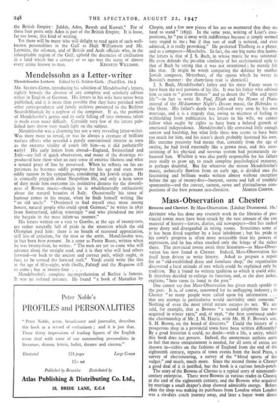Mendelssohn as a Letter-writer
Mendelssohn Letters. Edited by G. Selden-Goth. (Paul Mac. 16s.)
MR. SELDEN-GOTH, introducing his selection of Mendelssohn's letters, rightly bewails the absence of any complete and scholarly edition either in English or German. His letters to his wife have never been published, and it is more than possible that they have perished with other correspondence and family archives presented to the Berliner Staatsbibliothek by a nephew of the composer. If so, the problem of Mendelssohn's genius and its early falling off into immense talent is made even more difficult. Certainly very few of the letters pub- lished here throw very much light on the subject.
Mendelssohn was a charming but not a very revealing letter-writer. Was there more to reveal, or was he always a creature of brilliant surface effects who revealed a purely conventional interior as soon as the extreme vitality of youth left him—as it did pathetically early? His early letters from abroad—England, Switzerland and Italy—are full of quick observation, and many of the drawings re- produced here show what an easy sense of exterior likeness and what a natural grace of line he possessed. When he reflects on his ex- periences he becomes oddly pompous for his age and even more oddly narrow in his sympathies, considering his Jewish origin. He is comically priggish about Neapolitan life, and only a keen sense of duty made him overcome his instinctive distaste for the slovenli- ness of Roman music—though he is wholeheartedly enthusiastic about the natural beauties of Italy. Occasionally his sense of humour comes to his rescue, when he finds himself writing like " an old uncle." " Overjoyed to find myself once more among honest, natural people who could speak German," he writes in 1831 from Switzerland, adding winningly " and who plundered me into the bargain in the most infamous manner."
His letters written on a visit to Goethe, at the age of twenty-two, are rather naturally full of pride in the attention which the old Olympian paid him : there is no breath of reasoned appreciation, still less of criticism, for the man or the artist. Mendelssohn was, in fact born bien pensant. In a letter to Pastor Bauer, written when he was twenty-four, he writes: " The men are yet to come who will advance along the straight road, and it is they who will lead others forward—or back to the ancient and correct path, which ought, in fact, to be termed the forward path." Verdi could write like this at the age of fifty-eight, with Otello, Falstaff and the Requiem still to come ; but at twenty-four . . .
Mendelssohn's complete incomprehension of Berlioz is famous. It was no isolated instance. He found " a book of Mazurkas by Chopin, and a few new pieces of his are so mannered that they are hard to stand" (x835). In the same year, writing of Liszt's com- positions, he " put it away with indifference because it simply seemed very stupid to me ; but if that sort of stuff is noticed, and even admired, it is really provoking." He preferred Thalberg as a player, and as a composer—Moscheles. In fact, the one big name that haunts the letters is that of J. S. Bach, in whose music he was saturated. He even defends the possible similarity of his ecclesiastical style to that of Bach by saying that it was not intentional ; he merely felt like that. (It might be worth comparing the defence by another Jewish composer, Meyerbeer, of the operas which he wrote in Rossini's manner : the chameleon trait is identical.) J. S. Bach, Mendelssohn's father and his sister Fanny seem to have been the real passions of his life. It was his father who advised him to turn to " graver themes " and to desert the " elfin and spirit life "—in fact to write St. Paul, Elijah and the Hymn of Praise instead of the Midsummer Night's Dream music, the Hebrides or -the Octet. His father's death was followed very soon by his own marriage, and it is a tragedy that, owing to niceness of feeling in withholding from publication his letters to his wife, we cannot follow what ought by rights to have been a belated growth of emotional independence. Mendelssohn's life contained little enough sorrow and hardship, but what little there was seems to have been too much for him, and his sister's death probably hastened his own. His extreme precosity had meant that, certainly from the age of twelve, he had lived externally like a grown man, and this over- straining of his physical and nervous system had prematurely ex- hausted him. Whether it was also partly responsible for his failure ever really to grow up, to reach complete psychological maturity, is perhaps doubtful. But for whatever the reason Mendelssohn's music, technically flawless from an early age, is divided into the fascinating and brilliant works written almost without exception before the age of twenty-five—buoyant, serene and full of youthful spontaneity—and the correct, earnest, suave and platitudinous com-
positions of the bien pensant neo-classicist. MARTIN COOPER.


































 Previous page
Previous page